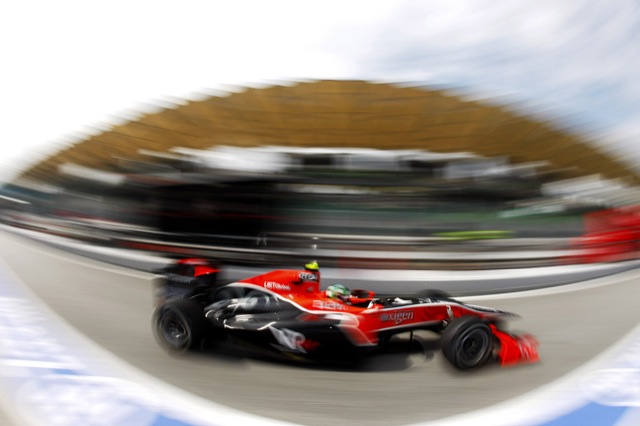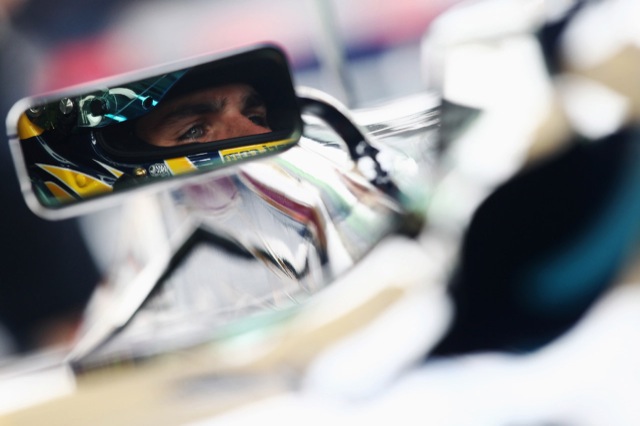During the Hungarian Grand Prix, several teams experienced small flash fires from the fuel as they refuelled the cars during pitstops. On occasion a team may experience a small spillage of fuel over the engine cover, and as it reaches the rear where the hot exhausts are, it can ignite. However, the fuel rig is clever and as soon as it recognises it wants to be removed, it shuts off prior to removal. This prevents fuel leaking from the nozzle, but doesn’t prevent overfill. In these cases, often the driver just leaves the pits and the fuel burns up before the pilot deactivates the speed limiter. But at least three teams suffered probems in Hungary – is there a problem…?
Kazuki Nakajima, Rubens Barrichello and Sebastien Bourdais each felt the heat during their pitstops, the Scuderia Toro Rosso team covering their French driver in extinguisher foam. Nakajima drove away and no harm was done, but questions will be asked after the race and as safety is absolute paramount, concerns are justified. Honda have mooted that the heat in Budapest may have expanded the fuel, hence the overflow. But surely Formula One has visited hotter places than Hungary this season? What about Malaysia?
The fuel rigs are standard across all teams and while fires are rare, they can be very serious. Jos Verstappen was engulfed in flames during the 1994 German Grand Prix, but thanks to his fire-proof overalls, he only suffered minor burns to his nose (Jos lifted his visor slightly to get air during the stop). More recently, Felipe Massa had a fuel-fire during the 2007 Spanish Grand Prix. The rear of his car ignited a small spillage, but the Brazilian was released from the garage and the fire burned out by the the time he got to the end of the pitlane.
However, while drivers are rarely harmed from fire anymore, having at least three teams suffering problems in one race, the rigs and surrounding circumstances clearly need to be investigated. One question raised in the Live Blog was centred around refuelling itself: Does Formula One really need it? In other formulae, refuelling doesn’t exist and the racing is just as exciting. And of course, by banning refuelling we prevent any further complication from qualifying and race fuel, as we saw last season.
Do you think refuelling is an important part of Formula One, or do you think it should be outlawed? Have your say in the comments…


















It is a must, IMHO, to ban refueling. Why? It’s not only about safety but these days when everyone is concerned about environment burning huge amounts of fuel should not be the most exciting part of Formula 1. And as easy as it could be banning refueling will force teams to think not only about the size of a fuel tank but about the engines themselves and the economical consumption of fuel. The question is of course how can it be done when no engine development is allowed. I think it goes the same direction as KERS – towards less fuel consuming Formula 1. Moreover, I believe it should be the direction F1 should have been heading for decades. Instead of banning features that artificially slow down the car (tyres just to name one) fuel economy could have done it much more reasonably and even by today F1 would be showing the same pace with much lower fuel consumption. After all, it could have shown many useful insights for everyday car production… So I think it is just another example of irrational behaviour of F-1 heads but it doesn’t seem something is going to change soon…
Don’t forget Jos’s fire was caused by Benetton cheating and removing a filter from the rig.
Schumacher had a small fire in Austria one year and still won the race.
[…] lap 32, a series of small fuel fires drew attention to the pitlane once again. Sebastien Bourdais was covered in extinguisher foam as he […]
Timo Glock also had a problem with refuelling during his first pitstop, although there was no fire that time.
I think as long as the refueling is safe it should stay although I do understand all the logic behind the arguments against refueling.
This race weekend did prove that refueling is safe. I mean despite all the flash fires nothing really happened, all the fires were put out, all drivers went on with their races. Only Bourdais had to come back for extra stop to get the fire extinguisher foam cleaned up from his visor …
That however does not changed anything on fact that FIA needs to get to the root of the problem and find out why the fires happened. TV commentators blamed heat, we had hot races before without the same consequences …
People talking about environment, and carbon footprint in Formula 1, hahah, next year, I suppose to see Miles Per Gallon next to the BHP, Torque tables in the car posters . Hahaha, my stomach hurts..
Two issues with refueling:
1.) Would banning refueling make the racing safer?
2.) Would banning refueling make the racing better?
Answer #1. Objectively, yes, banning refueling would make the racing safer, since you would be cutting out that risk of fire entirely. That said, how big is the risk? Other than 1 or 2 moments (like the Verstappen fire) there really haven’t been any major problems with fire.
I never understood why, when F1 brought back refueling, they used the pressurized fuel rigs that they still use. Watching North American racing, most series here that refuel use gravity-fed fueling systems. When fires happen, they are not catastrophic. I’ve never heard or read anything about why F1 doesn’t use a gravity-fed refueling system rather than a pressurized one – wouldn’t this eliminate some risk?
Answer #2. Having watched F1 when refueling was banned (from mid-80s to mid-90s) and now when it hasn’t been…I can’t say the racing is any better or worse simply because of refueling. Many GPs in the 80s turned into economy runs, since drivers would have to budget their fuel consumption since they couldn’t refuel. (The 1985 San Marino GP comes to mind.) I think allowing a limitless supply of fuel is a good thing, since the drivers can race as hard as they can (or their tires allow).
Banning refueling would be a good thing IF…teams were allowed to put as much fuel as they wanted in after final qualifying…final qualifying would then be purely about competing for the pole and going as fast as you can. And…if the tire manufacturers had to bring 3 or 4 different compounds – hard, medium, soft, supersoft – and then drivers and teams would have to strategize if they wanted to do a 3, 2, 1, or 0 stop race based on tire wear. No requirements about using certain compounds. That would make for more complicated strategy and good racing – and also bring driver skill into the equation more, too.
Is there not a set of contacts on the surface of the pit meant to ground the car and prevent static discharge? It seems to me if there was some widespread problem with these it could have contributed to the fires.
I think re-fueling should be banned. It is acceptable for drivers to be put at risk but not mechanics or in some cases spectators where the Paddock Club is above the pits.
Re-fueling adds nothing to racing. I am fed up hearing drivers waiting until the stop to make a move. Ban pit stops other than for essential work and drivers are forced to take a place from another driver rather than sit and wait to find out who put 2 kg extra fuel in their tank. Do we really want grands prix decided on who guessed right on fuel load?
KERS is utterly stupid on so many levels that I can’t believe even Max thinks its a good idea. Of course the fact is that he doesn’t understand it and simply ripped off McLaren’s idea which he banned years ago. KERS in a racing situation where cars produce massive braking decelerations and have discs running at 800 – 1000C makes sense in terms of performance gain. It will make deadly dull racing though.
On a road car KERS maks no sense whatever. Maybe you could make a case on a hybrid but not on a petrol or diesel car it is ridiculous. KERS can only recover energy from braking but anyone who is remotely interested in the environment or simply in saving petrol knows that the best way to drive is to anticipate slowing down and simply let speed decay by getting off the throttle early and not braking hard. What eactly is KERS going to do on a motorway journey? It is going to result in more petrol being burned to haul it along at 70ish mph. Where is the sense in that?
Max made a statement earlier this week saying that in his mind it was inconceivable that in ten years time cars could be built that did not recover heat energy from the brakes. I don’t know about anyone eles but my car produces a lot more heat from its engine than its brakes and once it is up to temperature the heat output of the engine is pretty constant unlike brakes which can be cold for 30 minutes on he motorway and then produce a little heat and then go cold again. Surely it makes a lot more sense to recover the continual waste heat from the engine than the occasional heat from the brakes.
Think of everything that would be involved in a roadgoing KERS system. Imagine the amount of carbon dioxide produced developing it, mining raw materials, processing them and eventually producing and installing a fully functional KERS system. Now imagine how often and how hard you are going to have to use the brakes in any normal road car to save the amount of CO2 that was generated in putting it on your car in the first place. Not to mention the extra CO2 you are producing hauling the thing around with you.
KERS can give a performance gain on a track but there are far better and far more sensible alternatives on the road.